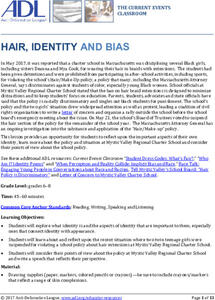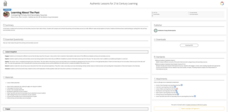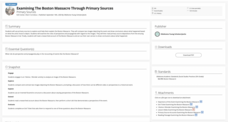Curated OER
Putting it Together: Analyzing and Producing Persuasive Text
Young orators demonstrate what they have learned about persuasion and persuasive devices throughout the unit by analyzing a persuasive speech and then crafting their persuasive essays. Class members engage in a role-play exercise, use...
National Endowment for the Humanities
Remember the Ladies: The First Ladies
Young historians name at least five First Ladies, describe something significant each did, and state five traditional duties of First Ladies. They discuss some untraditional things First Ladies have done as well.
John F. Kennedy Center
Comparing Cultural Holidays
A instructional activity examines the holidays, Día de los Muertos and Halloween. After an exciting clip from the movie Coco, class members review vocabulary and discuss what they know about Halloween. The conversation leads into the...
Core Knowledge Foundation
Unit 8: Code Talker by Joseph Bruchac Teacher Guide
Joseph Bruchac's Code Talker tells the remarkable story of Navajo Marines' role in battles of the Pacific Theater during World War II. As scholars read the novel, they also engage in activities that expand their knowledge of Navajo...
Core Knowledge Foundation
Unit 7: Anne Frank’s Tales from the Secret Annex Teacher Guide
Frequently banned, often challenged, a mainstay of middle school curriculum, Tales from the Secret Annex, is the featured text in the seventh unit in the Teacher Guide Core Knowledge Program. The 134-page guide includes an introduction,...
Core Knowledge Foundation
Unit 6: The Genius of the Harlem Renaissance Teacher Guide
Introduce your seventh graders to the Harlem Renaissance with a unit that explores this dynamic period's music, literature, and ideas. The 160-page guide includes a unit calendar, an introduction to the unit, 10 richly detailed lessons...
National Endowment for the Humanities
Frances Ellen Watkins Harper’s “Learning to Read”
Frances Ellen Watkins Harper's poem "Learning to Read" is the focus of a lesson that teaches middle schoolers how to do a close reading of a text. The lesson introduces them to a brief biography of the poet, includes a video reading, and...
Anti-Defamation League
Hair, Identity and Bias
Middle schoolers weigh in on dress codes, specifically those that apply to hair and make-up, with a lesson that uses a 2017 case from a charter school in Massachusetts. Class members read about two girls suspended for violating the...
Anti-Defamation League
Hair Discrimination and the CROWN Act
The CROWN Act (Creating a Respectful and Open World for Natural Hair) is the subject of the instructional activity that asks groups to research the stories of five different women and share their insights in a jigsaw activity....
Curated OER
Day of the Dead (Dia de los Muertos) - A Cultural Holiday: Color Exploration of Warm and Cool Colors
Young artists examine pictures from and discuss the holiday Día de los Muertos. The symbolic skull showcases the use of warm and cool colors. Color exploration allows learners to use coordinating colors to create two paper...
Curated OER
Mexican Folk Art: Sugar Skulls
Scholars use their knowledge of color to create vibrant skulls for Día de los Muertos. A thoughtful discussion brings forth information about the special holiday. A review of cool colors and warm colors prepares learners for the creation...
Academy of American Poets
Teach This Poem: "Tamales on Christmas" by Christian Robinson
A lesson spotlights the poem "Tamales on Christmas" by Christian Robinson. Scholars discuss their favorite foods and then examine a lively picture of a family preparing tamales. After listening to the poem twice, learners participate in...
Teaching for Change
Latino/Hispanic Heritage Resource Packet
Here's a must-have resource for Latino/Hispanic heritage month, September 15 through October 15. The 18-page packet includes suggestions to guide your planning, quizzes to test knowledge of heritage facts and immigration myths, and...
Anti-Defamation League
Who Was César Chávez?
Scholars complete a KWL chart to indicate what they know about Cesar Chavez and then research what they want to know about this farm worker, labor leader, and civil rights activist. To complete the lesson, scholars research modern civil...
National Endowment for the Humanities
"Sí, se puede!": Chávez, Huerta, and the UFW
"Sí, se puede!" Cesar Chavez and Dolores Huerta believed organizing farm workers and changing their working conditions were possible. Scholars examine provisions of the Bracero Program, videos, and the United Farm Workers' (UFW) work....
Academy of American Poets
Teach This Poem: "November 2: Día De Los Muertos" By Alberto Ríos
Scholars examine a colorful and detailed picture, then view an engaging video in preparation for reading the poem "November 2: Día De Los Muertos" by Alberto Ríos. Learners discuss their observations, feelings conveyed, and the...
Anti-Defamation League
“They Don’t Know Me”: Exposing the Myths and Establishing the Facts about Immigration
Middle schoolers engage in a activity that teaches them to distinguish myths from facts about United States immigration. Class members take an immigration quiz, watch a "What Would You do" video, and discuss how they could be an ally to...
Anti-Defamation League
"What is it Like to be an Outsider?”: Building Empathy for the Experiences of Immigrants
This instructional activity highlights the struggles of immigrants and the importance of showing empathy. Beginning with a read-aloud of a book in another language and a poem, scholars take part in a thoughtful discussion. Then, the...
K20 LEARN
Learning About The Past: Comparing Primary And Secondary Sources
Scholars find out how primary and secondary sources help us learn the past. Beginning with an anchor chart, class members discuss and write the differences between primary and secondary sources; a card sort is added to the anchor chart...
K20 LEARN
Examining The Boston Massacre Through Primary Sources
The Boston Massacre is the focus of a lesson plan that explores primary sources. Scholars examine two primary source images and discuss the different perspectives on the historical event. After groups read a researched account, they...
K20 LEARN
Grandmother, What A Big Culture You Have!: Cultural Characteristics
A word splash activity introduces scholars to the lesson's theme—cultural characteristics. First, in examining Little Red Riding Hood by The Brothers Grimm, learners highlight the cultural characteristics and then spot the differences in...
Overcoming Obstacles
The Big Day
Check and double-check! That's the big idea as teams prepare to launch their Service Learning Projects. They review their action plans, materials lists, timelines, schedules, and memos, brainstorm last-minute project needs, issues, and...
Overcoming Obstacles
Public Assessment
How'd we do? Class members consider different forms of public assessment and select a method or methods they will use to craft a formal public assessment of their Service Learning project. Participants then present their assessments.
Overcoming Obstacles
Self-Assessment
The project is over! Now it's time to sit back, reflect, and assess. Guided by the provided questions, individuals assess their project and participation.

























